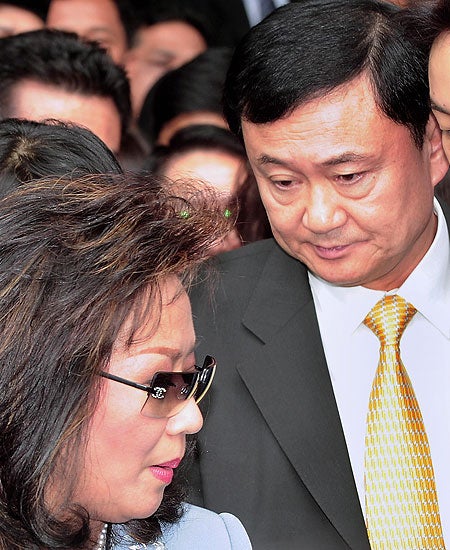Deposed Thai PM flees to Britain amid court case

Your support helps us to tell the story
From reproductive rights to climate change to Big Tech, The Independent is on the ground when the story is developing. Whether it's investigating the financials of Elon Musk's pro-Trump PAC or producing our latest documentary, 'The A Word', which shines a light on the American women fighting for reproductive rights, we know how important it is to parse out the facts from the messaging.
At such a critical moment in US history, we need reporters on the ground. Your donation allows us to keep sending journalists to speak to both sides of the story.
The Independent is trusted by Americans across the entire political spectrum. And unlike many other quality news outlets, we choose not to lock Americans out of our reporting and analysis with paywalls. We believe quality journalism should be available to everyone, paid for by those who can afford it.
Your support makes all the difference.Deposed Thai Prime Minister Thaksin Shinawatra and his family have fled to the United Kingdom, the former leader said today after he and his wife skipped a hearing on corruption charges in a Thai court.
A handwritten statement from Thaksin said he fled because he could not expect justice in Thai courts. It came amid newspaper reports that he would seek asylum in Britain.
"My wife and I have traveled to reside in England," Thaksin said in the statement. "If I still have luck, I would come back and die on Thai soil like every other Thai person."
Thaksin's statement, which did not mention asking for asylum, was read Monday afternoon on state-run television.
Thaksin, who was deposed in a 2006 military coup, faces a slew of court cases as well as investigations probing alleged corruption and abuse of power during his five years in office. In his statement, he again said he was innocent of all accusations against him.
"What happened to my family and me is like fruit from a poisonous tree — the fruit will also be poisoned," the statement said. "There is a continuation of dictatorship in managing Thai politics ... which is followed by interference in the justice system."
Thailand's stock market rose 3.2 percent amid hopes that Thaksin's removal would defuse political tension between his supporters and opponents.
Analysts, however, warned that his decision to reside in Britain did not mean the end of his influence.
"He is certainly going to use his foreign base to influence Thailand's domestic politics. It is going to be a very long story, and this is certainly not the end," said Charnvit Kasetsiri, a political scientist at Bangkok's Thammasat University.
Also, the key anti-Thaksin group, the People's Alliance for Democracy, said it would continue its street protests until the government of Prime Minister Samak Sundaravej was removed from office. The PAD regards Samak as a proxy for Thaksin.
"(Thaksin) still has influence over this government and is pulling the strings," said Piphop Thongchai, a key PAD leader.
Thaksin and his wife Pojaman failed to appear Monday morning before the Supreme Court's Criminal Division for Holders of Political Positions in a case involving an allegedly unlawful purchase of real estate.
The couple left Thailand last week after the court gave them permission to attend the Olympic Games in Beijing but ordered them to report Monday. News reports in Bangkok said Thaksin and Pojaman flew from China to England, where the former leader owns several properties and the Manchester City football club.
Thaksin lived in exile in Britain after his downfall. He returned to Thailand earlier this year to face corruption charges against him after his political allies won new elections and formed a coalition government.
"I thought I would be able to prove my innocence and receive justice, which is why I returned to Thailand on February 28. But the situation has deteriorated," Thaksin said.
He also said there had been threats against his life.
"I have also constantly received news that my life is not safe. Wherever I travel, I have to use bulletproof cars. This is the result I got from volunteering to serve the country, the king and the people," he said.
In Monday's court case, the couple had been charged with abuse of authority and corruption in Pojaman's 2003 purchase of a valuable plot of land in Bangkok from a state agency. The Supreme Court earlier said it would deliver a verdict Sept. 16.
In accordance with Thai legal procedure, the court normally grants defendants who skip a hearing a grace period of up to two weeks before issuing an arrest warrant.
Three political heavyweights have in recent times fled cases before the Supreme Court division dealing with Thaksin's case. They include a former minister of public health, the mayor of the resort city of Pattaya and a former deputy minister of the interior. One of the three was later arrested and jailed while the others, police say, are in hiding in Cambodia.
If this occurs in the Thaksin case, the former leader would the be declared a fugitive from justice which would probably have a bearing on his status in Britain as well as his ownership of Manchester City.
Thaksin is embroiled in three other court cases as well as a slew of investigations that may lead to trials. He has maintained his innocence against all allegations.
Thaksin was widely regarded as an authoritarian figure who eroded Thailand's still-fragile democratic institutions. Mass street protests led to his downfall.
But he was popular with the country's rural masses and urban poor with his populist policies.
Join our commenting forum
Join thought-provoking conversations, follow other Independent readers and see their replies
Comments